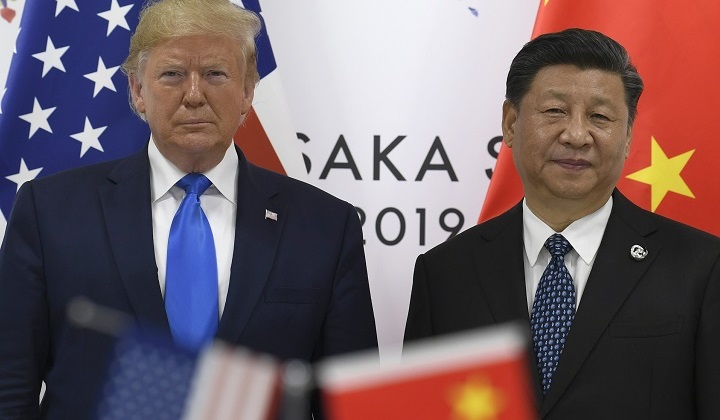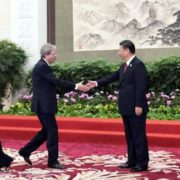
As US and China are driving away from each other at an ever-faster pace over an ever-larger number of issues, perhaps there is something in the experience of the Holy See with Beijing that could offer help and inspiration.
This has to start with the controversial agreement signed between Beijing and the Vatican.
Why has no other religion signed any agreement with the Communist Party, and in fact why does no other religion have diplomatic representation with China or other countries? This is because of the nature of the Holy See, both a state and the largest unitary religion in the world.
Here the Pope has the religious requirement that all heads of the local communities (the bishops with their dioceses) have to be in communion with Rome and their internal life has to be in accordance with a specific law of the Church, the Canon Law.
The Communist Party had no problem with Protestants, where bishops or pastors come from the local communities. That is, the CCP (Chinese Communist Party) can easily appoint its own men as pastors or bishops in other Christian faiths, who don’t have their leader residing in a foreign country and holding together more than a billion people scattered all over the world. This is impossible for the Catholic Church, where bishops are not recognized as such if they are not appointed by the Pope.
This is an old issue with all Christianity. Protestants left the Catholic Church as they could not stand the papacy.
Yet with the CCP the unity of the papacy is some kind of protection of the faith. Other religions, without a requirement of universal unity with a religious leader who is also head of some kind of state, can just be steamrolled by Beijing.
Tibetan Buddhism may have some similarities with Catholicism, but it is objectively different and the Dalai Lama has had a different strategy for dealing with China.
Then the Holy See chose to deal with Beijing because it can’t be pushed around “too much”—it needs to hold Chinese Catholics in unity with the rest of the world. Other faiths can either surrender or choose to be “subversive,” but the latter is a very difficult choice in China now.
China and the Holy See managed to work around this situation by being totally true to one another about their own needs. For China it was about respect for Chinese laws, and for the Catholic Church it was about the religious unity of the faith in the person of the Pope.
Then, behind the Vatican agreement there is the acceptance of a “philosophical-theological” principle—each is “king” in its own domain: the Chinese state rules civil life, and the Church is about spiritual life.
Of course, this recognizes a gray area because priests and bishops have to live in a given society, and the Church from Rome negotiates also on their behalf about this gray area.
Expanding the Vatican entente?
Is this settlement “exportable” to the US-China relationship? To some extent, yes, with the recognition of a philosophical principle.
For the Vatican, the principle was that the party being Marxist and thus materialistic can’t interfere with religious life. Religion can’t interfere with civil administration.
For the US-China relationship, the principle should be: China’s closed economy and politics, which have become so large, derail the rest of the fairly open global economy and politics. This is objective; it’s not ideology or love or hate for Chinese president Xi Jinping. China knows and should know that the derailment of the world economy is like ecological damage. In the short term it may help you, but in the medium and long term, it destroys you.
In very practical terms the problem is: Xi decides to ban tea and use coffee. The decision can be made secretly and overnight, and Xi’s confidants can short tea, long coffee, and make trillions in the hours before Xi’s public announcement on tea and coffee. This can have a global impact in the market, derailing it with massive “institutional” insider trading.
US president Donald Trump can also make the same decision on tea and coffee, and this can have an even bigger impact because the US economy is larger than that of China. But Trump can’t do it overnight. This has to be discussed by Congress and in the press—and it will take months if not years. Everybody will see it, everyone in the world can voice concerns and lobby for tea and coffee, and thus everyone can prepare. The chances of someone making trillions by shorting coffee or tea are minimal and have no significant impact on the global market.
This is a very practical problem, not ideological or strategic. Either China shuts down to the outside world, or it accepts world rules. Again, there is a lot of gray area to discuss, but once both sides have agreed, this is the real point and the rest may be a side dish.
Yet, as China has been dragging its feet for years on reforms, and even in talks with the Holy See, many doubt any significant progress is possible and many people out of China have become fed up with the CCP overall. No trust with the ruling CCP means there is almost no middle ground.
This has a direct impact on the situation in Hong Kong, where Beijing passed a new restrictive law on national security. This may have a huge influence on the market in the territory.
The territory is important to China because Beijing doesn’t allow full convertibility of the RMB. The fully convertible Hong Kong dollar, securely pegged on the US dollar and supported by Beijing, is the “relief valve” to ease some restrictions on RMB flow required for global trade and other purposes.
In fact, according to the “Impossible Trinity” or “Trilemma of Robert Mundell[1]: a country is only able to achieve two of the following three desirable monetary goals: (a) stable exchange rate, (b) controllable interest rate, (c) free movement of capital.
China does not have (c). Hong Kong does not have (b), because its interest rate is pegged to the US interest rates.
Usually, different countries face this trilemma with different unstable strategies to find a balance in perpetual imbalances. If Hong Kong weakens, China de facto shrinks her necessary free movement of capital, and it cannot recourse to future crypto currencies make up for the difference.
Yet to keep the three in some balance a country needs to have some small or large source of leverage to control the foreign environment and gain global trust. China feels it has little or no control of the foreign environment and it has dwindling global trust.
Again, here there could be philosophical and practical lessons to learn from the Vatican experience, but it is a fight against time. The later China decides to deal with the situation, the higher the price.
[1] I owe this part to Jeffrey Lau, whom I here thank.





